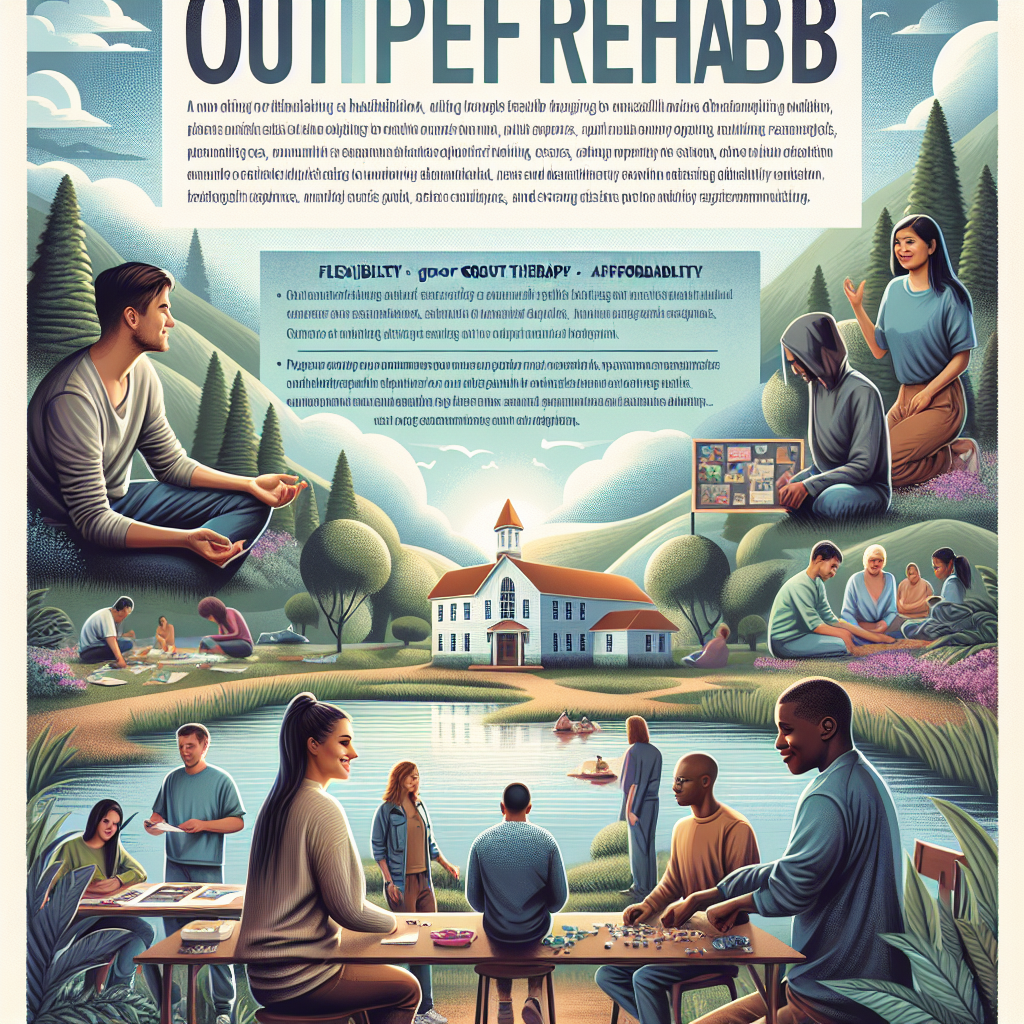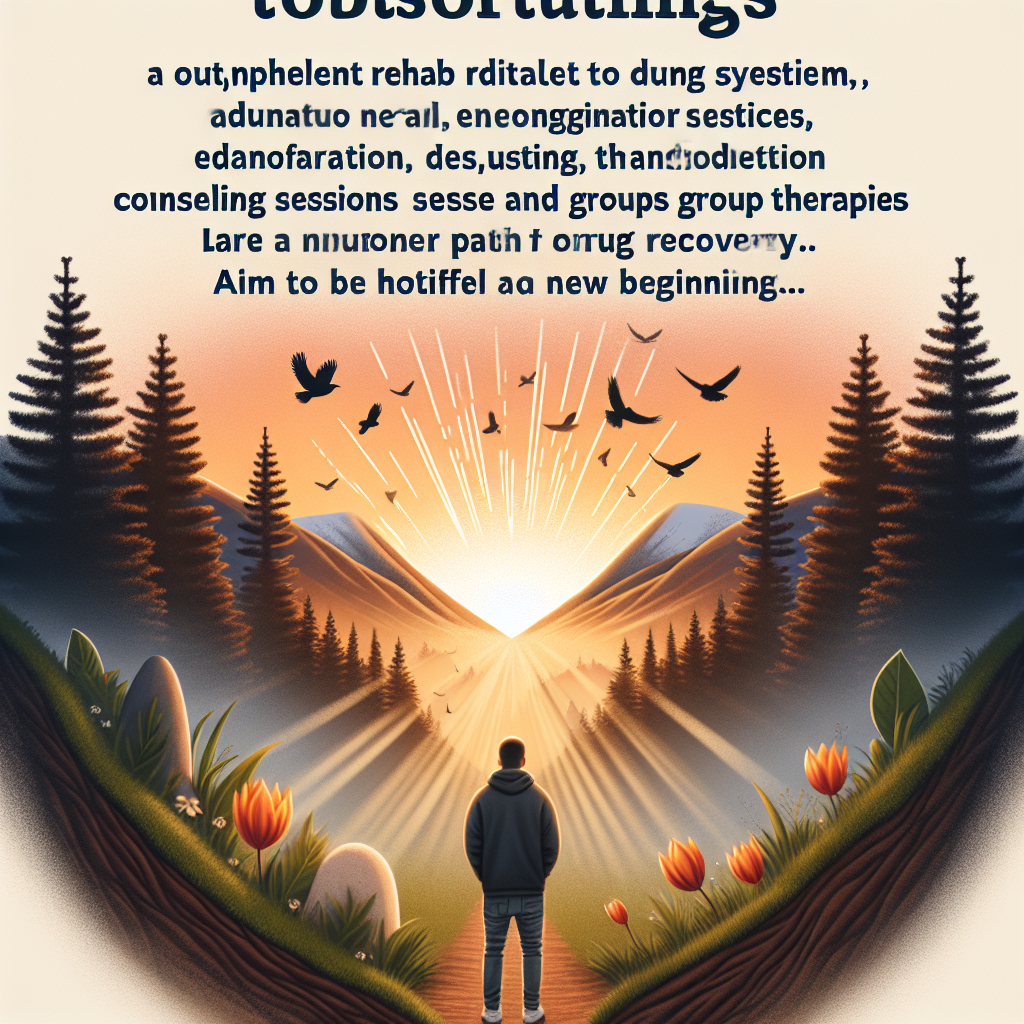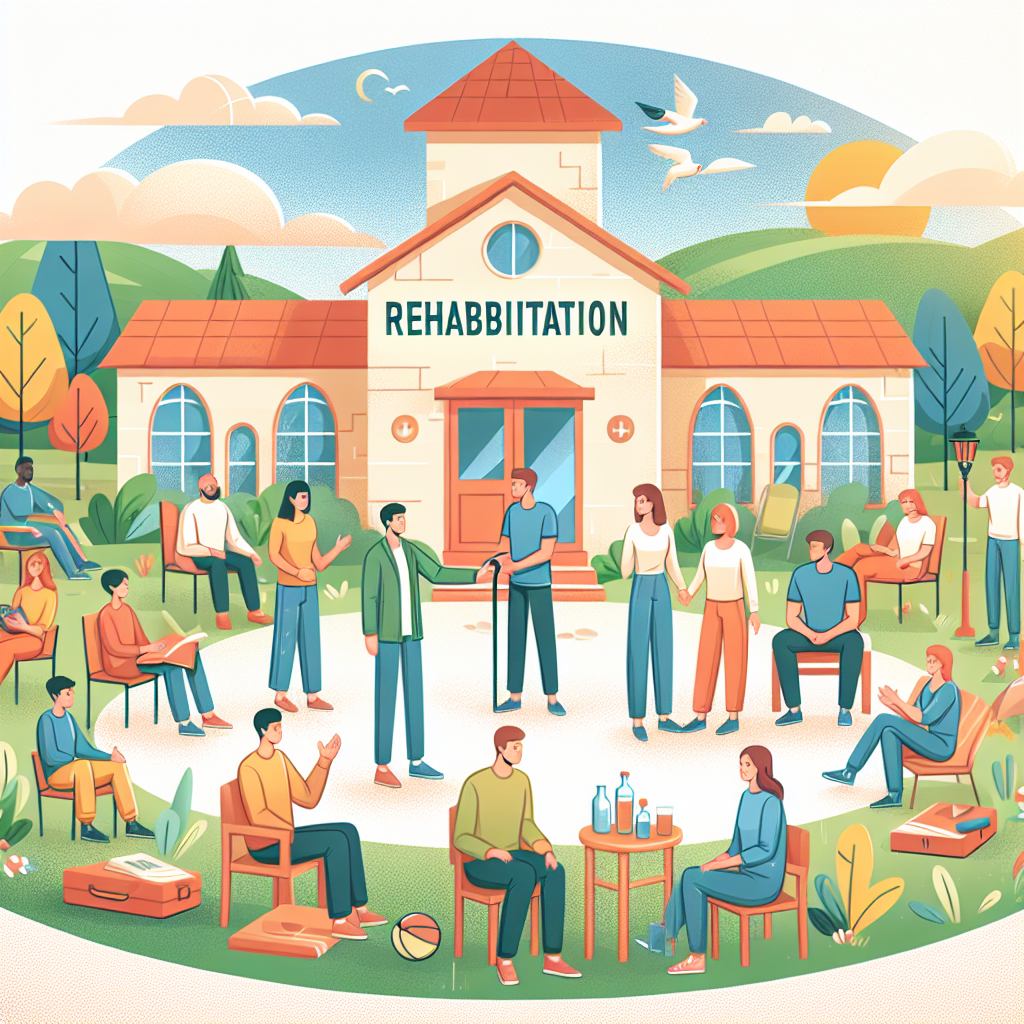-
Table of Contents

“Empower Recovery: Outpatient Rehab for Young Adults – Freedom, Support, and a Brighter Future.”
Introduction
Outpatient rehabilitation programs offer a flexible and effective approach to treating young adults with drug addiction. These programs provide essential therapeutic services while allowing individuals to maintain their daily responsibilities, such as work, school, and family commitments. Outpatient rehab combines evidence-based treatments, including individual and group therapy, medication management, and holistic approaches, to address the multifaceted nature of addiction. This model fosters a supportive community environment, encouraging peer interaction and accountability, which are crucial for long-term recovery. Additionally, outpatient rehab is often more cost-effective than inpatient options, making it accessible to a broader range of individuals. By integrating treatment into everyday life, outpatient rehab empowers young adults to develop coping strategies and resilience, ultimately leading to sustainable sobriety and improved overall well-being.
Enhanced Flexibility and Independence: Key Advantages of Outpatient Rehab for Young Adults
Outpatient rehab programs offer a unique blend of flexibility and independence, making them particularly advantageous for young adults grappling with drug addiction. Unlike inpatient programs, which require individuals to reside at a treatment facility, outpatient rehab allows participants to live at home while attending scheduled treatment sessions. This structure provides a sense of normalcy and continuity, enabling young adults to maintain their daily routines, whether that involves attending school, working, or fulfilling family responsibilities. The ability to integrate treatment into their existing lives can significantly reduce the stigma often associated with rehab, making it a more appealing option for many.
One of the most compelling benefits of outpatient rehab is the enhanced flexibility it offers. Young adults often have dynamic and demanding schedules, and the rigid structure of inpatient programs can be a deterrent. Outpatient rehab, however, provides a more adaptable approach. Treatment sessions can be scheduled around the individual’s commitments, allowing them to receive the help they need without completely disrupting their lives. This flexibility can be crucial in maintaining motivation and engagement in the recovery process, as it demonstrates that treatment can coexist with other important aspects of their lives.
Moreover, outpatient rehab fosters a sense of independence that is particularly empowering for young adults. The transition from adolescence to adulthood is a critical period marked by the desire for autonomy and self-sufficiency. Outpatient programs support this developmental stage by encouraging individuals to take responsibility for their recovery while still providing the necessary support and guidance. This balance can help build self-esteem and confidence, essential components in overcoming addiction and preventing relapse.
In addition to flexibility and independence, outpatient rehab offers the advantage of real-world application. Participants can immediately apply the coping strategies and skills they learn in therapy to their everyday environments. This real-time practice can be incredibly beneficial, as it allows individuals to navigate the challenges and triggers they encounter in their daily lives with the support of their treatment team. The ability to test and refine these skills in a real-world context can lead to more sustainable and long-lasting recovery outcomes.
Furthermore, outpatient rehab often includes a strong emphasis on community and peer support. Group therapy sessions and support groups are integral components of many outpatient programs, providing a platform for individuals to share their experiences and learn from others who are facing similar challenges. This sense of community can be particularly comforting for young adults, who may feel isolated or misunderstood in their struggles with addiction. Building connections with peers who are on the same journey can foster a sense of belonging and mutual encouragement, which are vital for sustained recovery.
Another significant advantage of outpatient rehab is its cost-effectiveness. Inpatient programs can be prohibitively expensive, and the financial burden can be a significant barrier to seeking treatment. Outpatient programs, on the other hand, tend to be more affordable, making them accessible to a broader range of individuals. This accessibility ensures that more young adults have the opportunity to receive the help they need without the added stress of financial strain.
In conclusion, the enhanced flexibility and independence offered by outpatient rehab make it an ideal option for young adults struggling with drug addiction. By allowing individuals to maintain their daily routines, fostering a sense of autonomy, providing real-world application of skills, emphasizing community support, and being cost-effective, outpatient rehab addresses the unique needs of young adults. This approach not only facilitates recovery but also empowers individuals to take control of their lives and build a healthier, more fulfilling future.
Building a Supportive Community: How Outpatient Rehab Fosters Long-Term Recovery in Young Adults
Outpatient rehab programs have emerged as a beacon of hope for young adults grappling with drug addiction, offering a unique blend of flexibility and support that is crucial for long-term recovery. Unlike inpatient programs, outpatient rehab allows individuals to maintain their daily responsibilities, such as work, school, and family commitments, while receiving the treatment they need. This balance is particularly beneficial for young adults, who often face the dual pressures of academic and social obligations. By integrating treatment into their everyday lives, outpatient rehab helps young adults develop the skills necessary to navigate real-world challenges without resorting to substance use.
One of the most significant advantages of outpatient rehab is the sense of community it fosters. Young adults often feel isolated in their struggles with addiction, but outpatient programs provide a supportive network of peers who are facing similar challenges. This communal environment encourages open dialogue and mutual understanding, which are essential for emotional healing. Group therapy sessions, a staple of outpatient rehab, offer a safe space for individuals to share their experiences and learn from others. These interactions not only reduce feelings of isolation but also build a sense of camaraderie and accountability that is vital for sustained recovery.
Moreover, outpatient rehab programs often incorporate family therapy, recognizing the pivotal role that family dynamics play in the recovery process. Young adults are still deeply influenced by their family environments, and involving loved ones in therapy can help address underlying issues that may contribute to substance use. Family therapy sessions aim to improve communication, resolve conflicts, and establish a supportive home environment, all of which are crucial for long-term recovery. By fostering healthier family relationships, outpatient rehab helps create a stable foundation upon which young adults can rebuild their lives.
In addition to emotional support, outpatient rehab provides practical tools and strategies for managing addiction. Cognitive-behavioral therapy (CBT), for instance, is commonly used to help individuals identify and change negative thought patterns that lead to substance use. Through CBT and other evidence-based therapies, young adults learn coping mechanisms and problem-solving skills that empower them to handle stress and triggers more effectively. These therapeutic approaches are complemented by educational workshops on topics such as relapse prevention, nutrition, and mindfulness, which equip individuals with a holistic understanding of recovery.
Furthermore, the flexibility of outpatient rehab allows young adults to apply what they learn in real-time, reinforcing their progress and building confidence in their ability to maintain sobriety. This real-world application is a critical component of long-term recovery, as it helps individuals develop resilience and adaptability. The ongoing support from counselors and peers also provides a safety net, ensuring that young adults have access to guidance and encouragement whenever they encounter obstacles.
Ultimately, the goal of outpatient rehab is not just to achieve sobriety but to foster a fulfilling and purposeful life. By building a supportive community, addressing family dynamics, and providing practical tools for managing addiction, outpatient rehab empowers young adults to reclaim their futures. The journey to recovery is undoubtedly challenging, but with the right support system in place, young adults can overcome addiction and thrive. The sense of belonging and empowerment cultivated in outpatient rehab serves as a cornerstone for long-term recovery, proving that with determination and support, a brighter future is within reach.
Q&A
1. **Question:** What is one key benefit of outpatient rehab for young adults with drug addiction?
**Answer:** One key benefit of outpatient rehab for young adults with drug addiction is the ability to maintain daily responsibilities such as work, school, and family commitments while receiving treatment.
2. **Question:** How does outpatient rehab support the social needs of young adults with drug addiction?
**Answer:** Outpatient rehab supports the social needs of young adults with drug addiction by allowing them to stay connected with their support networks and engage in community activities, which can be crucial for their recovery and reintegration into society.
Conclusion
Outpatient rehab for young adults with drug addiction offers numerous benefits, including flexibility in scheduling, which allows individuals to maintain their daily responsibilities such as work or school. It provides a supportive environment where young adults can receive therapy and counseling while staying connected to their community and family. Outpatient programs often cost less than inpatient treatment, making them more accessible. Additionally, these programs can offer a continuum of care, helping to prevent relapse by providing ongoing support and resources. Overall, outpatient rehab can be an effective and practical option for young adults seeking recovery from drug addiction.



